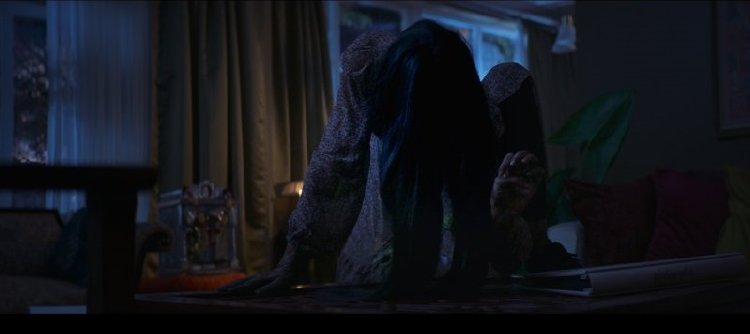It Lives Inside

Tired of being singled out as an outsider in high school, Samidha (Megan Suri, 2023's "Missing") begins to reject her Hindu heritage, greatly upsetting her mother Poorna (Neeru Bajwa) while her father Inesh (Vik Sahay) tries to give her space. She even distances herself from her childhood best friend Tamira (Mohana Krishnan), her rejection becoming cruel when Tamira begins acting oddly, but when her friend disappears after Sam breaks the jar Tamira had been obsessing over, Sam begins to believe that “It Lives Inside.”
Laura's Review: B-
Cowriter (with Ashish Mehta)/director Bishal Dutta makes an assured feature film debut but his love of the genre he’s chosen results in one too many references to other films. On the one hand, you can admire Dutta’s technical proficiency and the performances he’s gotten from his cast while on the other continually experience déjà vu.
When Tamira starts wondering high school hallways with her long black hair almost obscuring the fact that she looks like she hasn’t slept in weeks while clasping a glass jar with what looks like a powdery black substance inside, concerned teacher Joyce (Betty Gabriel, "Get Out") questions Sam about the situation and is shaken off. She’s trying to make new friends, like Kittie (Beatrice Kitsos), who asks her to speak in Hindu but shrinks away whenever Tamara appears. So when a desperate Tamara, who we’ve seen slipping chunks of raw meat into her quickly reclosed jar, approaches Sam at school, asking her to please believe what she is about to tell her, Sam responds by calling her an f’in psycho and smashing the jar onto the floor. Sam immediately regrets what she has done, but understanding its import will come to her more slowly, beginning with the singed book initialed ‘KC’ Tamara drops as she flees.
We’ll hear the name of the boy who belonged to those initials at the puja, a Hindu ritual, Poorna holds for Tamara, whose family was lost in tragedy in the same town, the very type of thing that makes everyone else regard the Hindus in their midst with the suspicious curiosity Sam hates. Sam enrages her mother by slipping out of the gathering, gone to meet cute boy Russ (Gage Marsh) at an outdoor party where she knows no one. Turns out Russ isn’t just a pretty face as he recognizes Sam’s distress and immediately drives her to the condemned, partially burned home where the journal owner lived to see what they might find. And while they avoid the basement where the boy’s body was found (so you can be sure this is where they really *should* have looked), they find a lot, the boy’s bedroom covered in paintings of a monster escaping…or is it entering…a boy’s body through his mouth. But while the burgeoning romance begins to heat up on the swing set outside, Sam hears her name being called from inside and, going into a trance, reenters the house alone, only to emerge when she hears Russ screaming, attacked by something unseen which leaves him dead. Sam’s about to be stared at again.
Sam finally talks to Joyce, who approaches her directly now, given what’s happened, and it is Joyce who determines the painting Sam snapped a photo of is a Pishach that feeds on negative energy, gradually devouring your soul and attacking anyone who tries to help you. Sam will also open up to Poorna, who not only believes her daughter, but begins the rites to vanquish the monster Sam will eventually have to return to that basement to do battle with.
Dutta has a lot to say about the immigrant experience, that sometimes uncomfortable conflict of honoring one’s family traditions while trying to assimilate into another culture, and Suri expresses this well with quiet rebellion and shy experimentation. It is the genre elements that disappoint, however, this viewer only momentarily chilled as Joyce is threatened in an empty school, and even that long sequence is indebted to “Session 9” among other films. Tamara is too redolent of “Ringu’s” Sadako (as is Poorna in one of Sam’s nightmares) and the violent black scratchings in KC’s journal have been seen far too many times. Narratively the film takes a major unearned shortcut when Sam is simply allowed to say nothing after Russ’s death, the police apparently finding no reason to question her. We also must wonder why Sam never thinks to check in on Joyce, the woman who’s vowed to help her, once Sam is aware that the Pishach will surely come for her.
Tech credits (cinematography by Matthew Lynn, editing by Jack Price) are solid and Wesley Hughes has crafted an unusual score featuring a sustained string note. Dutta’s also come up with a ‘One Year Later’ coda that is more effective than his actual climax. “It Lives Inside” is a solid debut, but in 2021 there was a more impressive, if more modest, twist on an Islamic version of this evil called “The Djinn.”
Neon releases "It Lives Inside" in theaters on 9/22/23.

